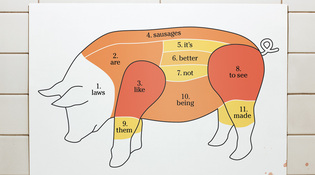 loading
loading
Arts & CultureYou can quote themYale law librarian Fred R. Shapiro is editor of the <i>Yale Book of Quotations</i>.
 Photo illustration: John Paul Chirdon.View full imageAmong the most criticized aspects of our public life are the messiness and abuses of the legislative process. Two of the quotations readers ask about most frequently relate to this topic. One of the most popular modern sayings is the one that compares laws to sausages. It is commonly credited to the nineteenth-century German statesman Otto von Bismarck. However, the earliest attribution to the Iron Chancellor that I am able to find in extensive database searching of historical texts is dated 1933. In that year Claudius O. Johnson wrote in Government in the United States (found through a Google Books search): "I think it was Bismarck who said that the man who wishes to keep his respect for sausages and laws should not see how either is made." Who did originate this quip? I searched the four major online archives of old newspapers. The earliest occurrences I found clearly point to a particular person who may have been the coiner. He is mentioned in the very earliest citation: Laws, like sausages, cease to inspire respect in proportion as we know how they are made. — John Godfrey Saxe, quote in the Daily Cleveland Herald, March 29, 1869. John Godfrey Saxe was a lawyer-poet. (My first impulse is to call that an oxymoron, but then I reflect that Ovid, Seneca, Petrarch, Donne, Goethe, Walter Scott, Hugo, Robert Louis Stevenson, and Wallace Stevens were all lawyer-poets.) He was successful enough in his legal pursuits to become attorney general of Vermont and a two-time Democratic candidate for governor of New York. His interests, though, turned to journalism and literature; he became an editor of the Evening Journal, as well as publishing prolific verse in books and periodicals. His most popular poem was "The Blindmen and the Elephant." Another major sound bite to emerge from the rough-and-tumble milieu of 1860s New York politics is the following: The error arose from want of diligent watchfulness in respect to legislative changes. He did not remember that it might be necessary to look at the statutes of the year before. Perhaps he had forgotten the saying, that "no man's life, liberty, or property are safe while the Legislature is in session." — Final Accounting in the Estate of A.B. (1866) Because the judge writing this opinion, Gideon J. Tucker, referred to the quote in question as if it were an old saying, he is not generally regarded as its inventor. However, online searches show that there is no prior appearance in comprehensive collections of cases, legal treatises, law review articles, or Congressional documents, nor in vast databases of newspapers and magazines. Tucker, therefore, seems entitled to at least a provisional status of earliest user. Who was Gideon J. Tucker? Like Saxe, he was a lawyer, politician, and newspaper editor, although without the poetic sideline. As an editor, he founded the New York Daily News. As a politician, he was New York's secretary of state and later held the title of surrogate of New York City, in which capacity he wrote the 1866 judgment cited above. He also gained firsthand experience in a legislature as a state assemblyman. Tucker does not appear himself to have been the sort of legislator who gave citizens reason to shake in their boots. He ensured the passage of New York's law preventing cruelty to animals, and he drafted the first bill attempting to limit work to eight hours a day.
The comment period has expired.
|
|